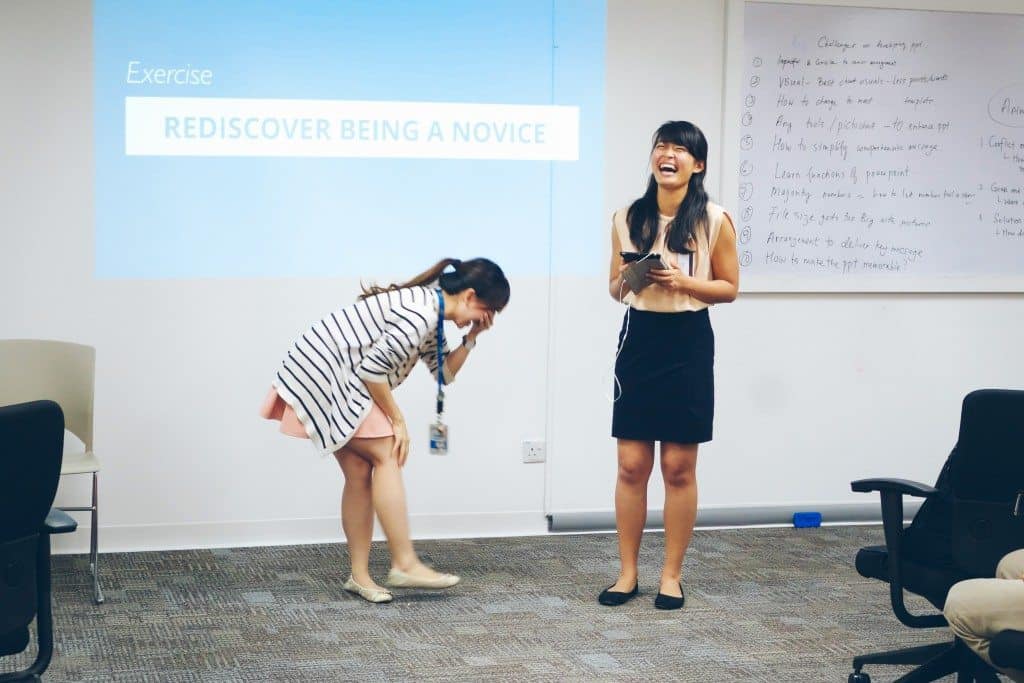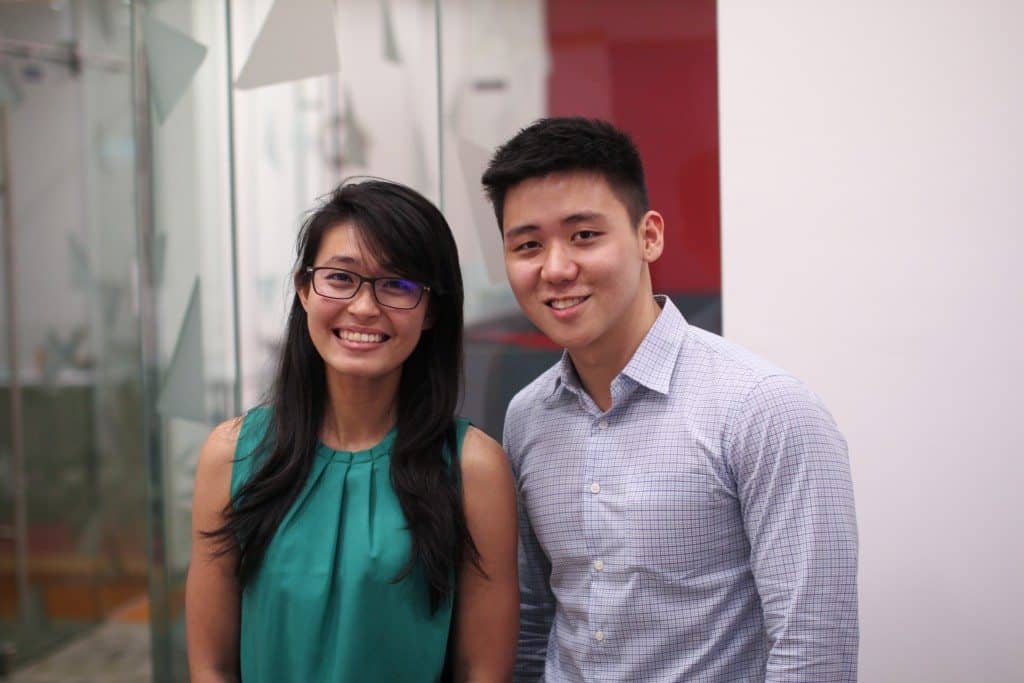I was introduced to Kai Xin by her business partner Eugene. We were looking to improve our deck presentation and I started a conversation with her to understand more.
The premise of their business is simply – they make amazing decks.
That was around the time when everyone was trying to emulate Steve Job’s deck but many didn’t know that Steve had a team of designers to put those together.
Here is one of their most popular deck that has gotten 2 million views!:
[slideshare id=36913987&doc=slidesharesethgodin-140712204335-phpapp01]
Back to Kai Xin, I was very impressed with this young lady.
Well-mannered, passionate and naturally very creative. As a father of 2 daughters (and two sons), Kai Xin is the kind of role model I would want my daughters to look up to.
The sacrifices she made to pursue her passion resonated with me as it brought me back to the time when I started my recruitment business. The belittlement, the struggles and the pains are all real.
But I’m sure without all that, she wouldn’t be who she is today.
1. Please share a bit about what you do.
In short: I help business leaders ace their high-stakes presentations through compelling visual stories. Being a co-founder of HighSpark (a presentation strategy, training and consultancy firm), I work closely with C-level executives to craft an effective presentation story to support their business goals.
Very often, our clients have fantastic ideas and solutions but struggle to communicate them in a clear, compelling and memorable manner. The stakes of their presentations are high and they just cannot afford to underperform.
Aside from being a story strategist, I’m also the lead trainer for our visual storytelling workshops; equipping corporate professionals on the know-how to develop effective visual presentations themselves.
2. What were you doing before starting your business?
I was studying at Ngee Ann Polytechnic! SlideComet (the former name of HighSpark) was born straight out of school after I’ve completed my diploma course in business studies, specialised in marketing communication.
Yes, if you’re wondering, I did not enter university.
3. What ignited the spark in you to start a new business venture?
It certainly was not an overnight “thing”. If I were to backtrack to when I was a 12 years old kid, I suspect that the little bit of “entrepreneurial” spirit was already in me – the attitude of wanting to do things my way, the desire to be independent and the want to try new things. As my family isn’t well off, I felt a need to be less reliant on my parents financially. I remember after my PSLE examination, together with a friend, we did door-to-door sales of jelly powder mix. Since then, I took all sorts of odd jobs during school holidays; whatever that brings me extra pocket money.
These, accompanied by the involvement in Business Pitch Competition, Innovation Challenge, school projects during Polytechnic years jolted my enthusiasm in the area of starting up. Creating solutions to solve real world problems became a deep-seated interest.
Why HighSpark of all businesses? That, I have to thank my co-founder, Eugene Cheng (also my project mate back in Poly days) for roping me into the venture as a business partner. Back in Business School, we were graded heavily on our presentations. Out of our desperation to stand out, there was a sudden revelation to take on a visual approach for our project presentations in the final year.
Kai Xin and Eugene of HighSpark.co
It did wonders and indeed helped us Ace our projects. Our peers and lecturers were blown away by our pitches and that’s when one of our lecturers planted a seed to make this skill set into a business.
Eugene started off by freelancing for a couple of agencies which he then saw a demand in the market and eventually decided to turn it into a business.
4. What sacrifices have you had to make to be a successful entrepreneur?
There’s a far and long journey ahead, so I wouldn’t consider myself to be successful just yet. However, a few sacrifices that I’ve made thus far to get to where I am now are:
a. Pride
While everyone is going to university and you’re not, it’s common to receive sceptical remarks.
People around including my parents doubted my decision. It’s challenging to go against the societal norms and pick the option which my parents could be proud of. I had to let go of views on how people would think of me.
At the same time, while I was a newbie, it was essential for me to be humble and learn from anyone who comes along the way.
b. Lifestyle and sleep
People say, when you’re an entrepreneur, your work becomes your way of life. In the beginning, I had to work around the clock and forgoing my carefree student lifestyle was necessary. With little systems and processes in place at our starting stage, going the extra mile to deliver quality work would often mean late nights.
c. Relationships
With a change of mindset and lifestyle, my circle of friends eventually turned as our priorities and outlook on life started to differ. Change is natural and it’s okay.
Having said that, I would think that a successful entrepreneur is one who can truly balance work and life. There is nothing more precious than spending time with our loved ones and with ourselves. That’s something I’m currently working towards.
5. How did you get funded?
As we’re a service provider, the startup and operation costs are low. The key expenses were spent on software licences, business registration fees, business bank deposit, etc. As such, there wasn’t a need to be heavily funded. Having said so, we were lucky to get up to $3,000 worth of seed funding from our alma mater to kick off our business.
We stayed lean and minimised our cash outflow by camping at our school’s canteen, leverage on the free air-condition, electricity and wi-fi. When our student wi-fi account expired, we befriended a few students to use theirs.
Instead of going to Starbucks and pay for expensive coffee, we got ourselves drinks like teh peng for $1.50. Food is cheap too. We also made a few barter trade for some services we needed.
6. Could you describe your first sale and how it came about?
SlideShare! To upload our presentations on SlideShare was the first obvious thing to do when we started our business. Back then, SlideShare wasn’t as saturated as it is now and it was rather easy to get our presentations featured on the frontpage. So we were lucky enough to have our first deck featured (below), which garnered us a hundred over thousands of views globally. That’s how our first client chance upon us. As he was based out of Singapore, we chatted remotely over a Skype call. We were lucky to be able to mask our young age because of that! I guess we sounded confident in what we do. Hence, we won his trust and the business.
[slideshare id=17979318&doc=createpresentationsthatareoutofthisworld-130401005314-phpapp02]
7. What has been your most successful form of marketing?
The best marketing is to (1) sell solutions, not features, (2) do quality work, (3) gain visibility, (4) build good relationships.
Solutions not features & quality work
When you do great work, it sells for itself. We were 19 when we first started the business. We had zero industry experience and no qualification in design (we studied business!). Our lack of design qualification(s) was never a consideration or a deciding factor for our clients to engage our services. Our portfolio work and consultative attitude are always the key factors to winning our client’s trusts. Rather than selling them our capabilities upfront, we empathise with their challenges and identify their needs. This way, every project is tailored to their unique set of goals and we can be sure the end results are always satisfactory, with high quality.
Visibility
Great work needs to get in front of the eyeballs. After our first business lead from SlideShare, we continued to upload presentations there. We were extremely fortunate to have all our presentations featured on the front page over the past two years. That got us a lot of traction and also boosted our search engine ranking on Google. The carefully written copy on our website plays a big role in the conversion rate as well.
Relationships
A big bulk of our clients is through referrals – our existing clients or friends whom we met at networking events. Many of them loved our work and shared them with their connections. We were also lucky enough to have many great people who came along to way and helped us.
8. Describe your typical day?
Daytime
Monday- Friday: Wake up, Wash up, Breakfast, Read while commuting, Work, Home, Side-volunteer projects, Wash up, Meditate, Sleep.
Saturday: Volunteer work, Meditate
Sunday: Time with Family
Evenings
Monday, Wednesday, Thursday: Me time/Social gatherings/Work on side-volunteer projects/Run/Attend ad-hoc events or classes
Tuesday: Group Meditation Session
Friday: Attend Buddhist Gathering/Talks
9. Who has been your greatest influence in your business and why?
There are a few. Eugene, my business partner, is one of the most significant influence in the business context. People say that we learn best if the people around us are better than we are. Eugene is one such person. He’s better at so many things – his resourcefulness, his visual thinking skills, his agility. These traits inspire me to constantly better myself so we can grow together, to grow the business.

Second greatest influence would be our clients. No clients = no business. Every client engagement is a learning experience. We gain insights and more empathy to what they need each time. The bad client experiences also taught us many lessons and resulted in a constant evolution and refinement of our systems and processes to develop quality work, without killing ourselves or our clients over it.
10. What has been your proudest moment in the history of your business and why?
There are so many moments to be proud of! If I were to pick one, it would be the time when I stopped calling ourselves a startup but a business instead (I’d have to thank Callum Laing for this inspiration). It means that we (ourselves and the business) have matured, and grown to be a sustainable business. I guess every company would share the same sentiment.
11. What were some of the biggest lessons that have impacted the way that you work?
When we were new and ignorant, we got a few bad experiences with demanding clients. There were too many stakeholders, the project timeline dragged, the scope of work exceeded, there were clashing opinions on what an effective presentation should be and we were undercharging.
These taught us big lessons on the importance of a well-crafted project agreement. Now our contract is 11 pages long! While it’s long, it helped a lot in aligning expectations, protecting both the clients’ interest and ours and also minimises tonnes of possible complications during the project engagement. Processes are refined and new frameworks are developed to improve the overall experience.
We’ve also learnt to detect red flags from business enquiries and became more selective of the clients whom we work with. Looking back, I am quite thankful for these bad lessons. We might have undercharged then, but the lessons learnt were priceless.
12. What is your greatest mistake / biggest screw-up over your entrepreneurial journey?
The biggest mistake in my entrepreneurial journey is the want to do everything and not learning the art of delegation earlier.
While there are many moments when I felt overwhelmed with the workload, I was too stubborn and chose to believe that if I were to do it myself, things would get done faster.
Instead of working on the business, I was working in it. This took away much precious time which I could have used to strategise what we could do with the talented interns and employees we’ve had.
Due to the lack of proper planning and patience, I felt that hiring extra hands created more work for myself. This resulted in a series of burnout.
13. If you could go back in time to speak to your 20-year-old self, what would you tell him/her?
I’m proud that you have chose to live your life purposefully.
14. What advice would you give to aspiring entrepreneurs?
a. Start something out of a desire to help solve problems that are worth solving, not for glory or because being an entrepreneur/startup is the new “in” thing to do.
b. Passion alone can’t earn you a living for life. Don’t sell yourself short! If you’re good at what you do, have more confidence (not arrogance) and charge what you’re worth. You’re often better than what you think you are.
c. While $ is important, there are a few things which are priceless: family, healthy, inner peace. There’s always time for these 3.
15. What’s your business focus for this year?
HighSpark will venture more on consultancy services, as well as corporate training. We have design three programmes, one to two days programmes on “stories that stick”, “visual persuasion” and “persuasive presentations” that sell.
Forming more meaningful collaborations is also our priority this year.
16. Where can people find you online?
Get connected via the following:
- LinkedIn: https://sg.linkedin.com/in/kohkaixin
- Facebook: https://www.facebook.com/k.kaixin
- Email: [email protected]
Note: For Facebook, please leave me a message to let me know who you are, where you’ve heard of me, or how we’ve met. This way, our virtual friendship would be a much meaningful one!
[reminder]Do you like my Interview With Entrepreneur series? Let me know what you think.[/reminder]





